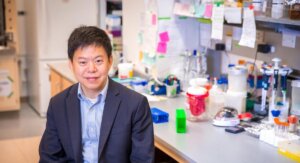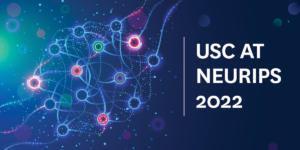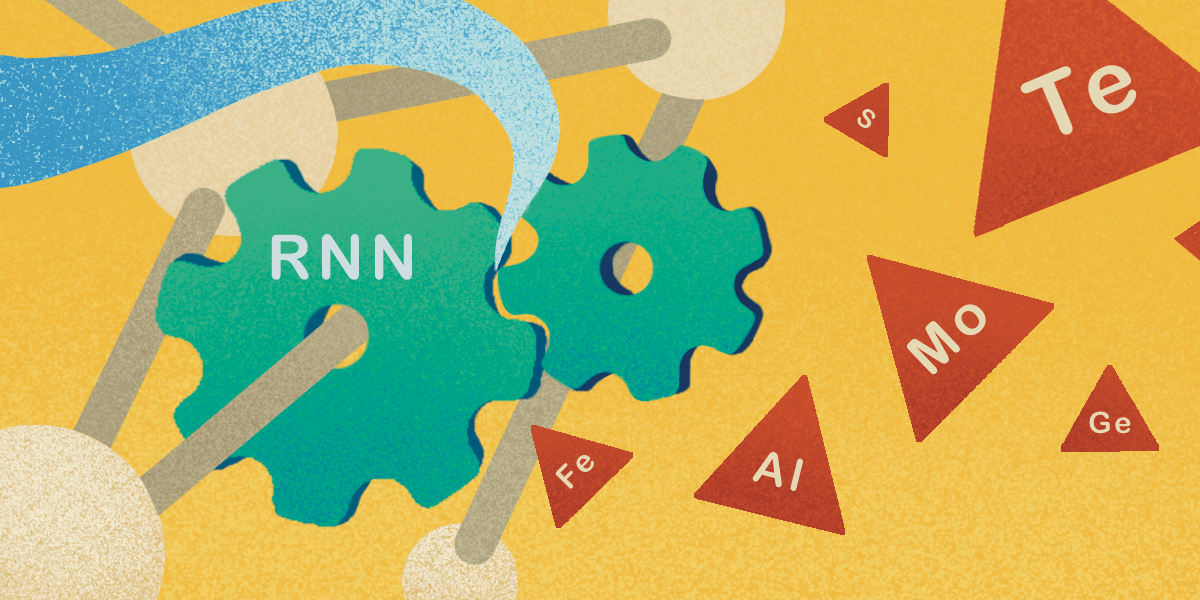
A machine learning model, called a recurrent neural network (RNN), is being used to predict a better polymer structure with high energy storage capacity. A polymer structure is fed to the RNN model (the green gear), resulting in a list of polymer structures which likely have better energy storage capacity (the red tetrahedrons). Illustration/Chris Kim
As the world sees rapid advancements in areas such as renewable energy, water management, transport, and quantum computing, the need for new types of advanced materials to support these emerging technologies is increasing. However, developing new materials is laborious—taking decades from concept to implementation.
The manufacturing sector is now turning to artificial intelligence (AI) and machine learning methods for faster materials discovery. But for those looking to pursue a career in this brave new world of materials engineering, there have been few graduate degree options tailored to the integration of materials with machine learning, until now.
To address this significant knowledge gap, the USC Viterbi School of Engineering’s Mork Family Department of Chemical Engineering and Materials Science has launched the new M.S. in Materials Engineering with Machine Learning, a first-of-its-kind Master of Science course, taught by experts in computational materials science and machine learning methods.

Chair of the Mork Family Department, Andrea Hodge
Andrea Hodge, Arthur B. Freeman Professor and chair of the Mork Family Department of Chemical Engineering and Materials Science, said that the course reflected an emerging interdisciplinary field that harnessed data and combined modeling and simulations, experiments, and machine learning technologies to create a new approach for materials discovery and manufacturing.
“Currently there are several online courses on materials engineering and courses on many aspects of machine learning, but there is no MS degree program that provides machine learning integration into materials engineering,” Hodge said.
“An increasing number of companies are incorporating a data-driven approach in their business models,” she said. “However, current materials engineering curricula are not addressing the demand due to the lack of integrated machine learning education.”
Machine learning can be used to discover new materials for a range of applications including 3-D printing, creating materials and membranes for water filtration, quantum information and computing, and to accelerate autonomous manufacturing and processes.
Machine learning can also be used in research and development, such as autonomous laboratories and high-throughput screening based on materials databases to develop high energy density capacitors, novel catalysts, solar panels with improved efficiency, and new drugs to combat viruses and diseases.
Ken-ichi Nomura, a senior lecturer in the Mork Family Department, said that machine learning would bring a paradigm shift in materials engineering.
“The aim is not to replace existing materials engineering education, rather reinforce it with new skillsets to significantly accelerate materials development and innovation,” he said.
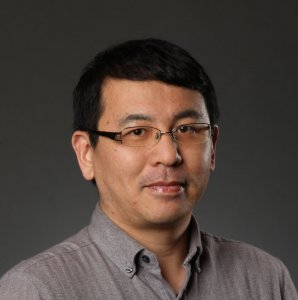
Ken-ichi Nomura, Senior lecturer in the Mork Family Department
The new master’s degree program focuses on machine learning that will allow the materials scientists and engineers of the future to find useful information for materials discovery using large amounts of data that humans otherwise would not have the capacity to process.
Nomura said that machine learning has shown tremendous success in areas such as computer vision—where systems can learn information from digital imagery and videos—as well as natural language processing, process automation, and other areas.
“However, domain expert knowledge is essential to fully take advantage of the power of these new technologies, because machine learning technologies are not directly transferrable to materials,” Nomura said. “The new master’s degree program will train the future generation workforce and offer exciting opportunities for USC graduates in industries that have incorporated data-driven discovery and materials development.”
Commencing in fall 2021, the program is aimed at graduate students with a broad range of science and engineering backgrounds, who are interested in the intersection of materials and machine learning—including students with a B.S. in physical sciences and engineering disciplines. The program is also geared toward those in the industry looking to expand their skill sets and apply machine learning techniques to their research and development efforts in materials and processing projects.
The program will cover the following key areas:
- The basics of machine learning, including supervised and unsupervised machine learning, regression and classification, as well as active learning and reinforcement learning.
- Deep learning methods and their applications.
- Simulation and machine learning projects to use databases for discovery and model materials properties.
Students will also have an opportunity to present results from their projects at the annual Mork Family Department student symposium.
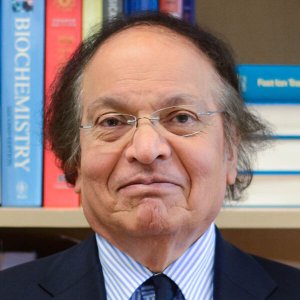
Priya Vashishta, Fluor Chair in Chemical Engineering
“There are also opportunities at startups that are using machine learning, as well as research careers in universities, industry, and at national laboratories,” said Professor Priya Vashishta, the Fluor Chair in Chemical Engineering.
Mork Family Department faculty who will be teaching in the program include Nomura, who has research expertise in high-performance simulations and machine learning, as well as Vashishta, Director of the Materials Genome Innovation for Computational Software center, who will focus on computational materials modeling and machine learning. Rajiv Kalia, professor of physics and astronomy, computer science, chemical engineering and materials science, will teach deep learning methods and their applications. Additional materials science, machine learning and data analytics classes taught by experts within MFD and USC Viterbi have been included as part of the elective courses to provide a broad educational experience in materials engineering with machine learning.
Published on August 19th, 2021
Last updated on December 7th, 2021




